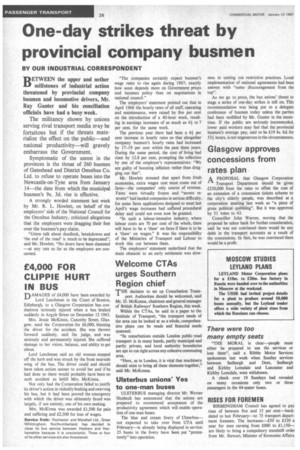One-day strikes threat by provincial company busmen
Page 28

If you've noticed an error in this article please click here to report it so we can fix it.
BY OUR INDUSTRIAL CORRESPONDENT
BETWEEN the upper and nether millstones of industrial action threatened by provincial company busmen and locomotive drivers, Mr. Ray Gunter and his conciliation officials have had a busy week.
The militancy shown by unions serving rival transport media tray be fortuitous but if the threats materialize the effect on the public—and national productivity—will gravely embarrass the Government.
Symptomatic of the unrest in the provinces is the threat of 260 busmen of Gateshead and District Omnibus Co. Ltd. to refuse to operate buses into the Newcastle-on-Tyne area from January 14—the date from which the municipal busmen's 9s. 3d. rise is effective.
A strongly worded statement last week by Mr. R. L. Howlett, on behalf of the employers' side of the National Council for the Omnibus Industry, criticized allegations that the employers were dragging their feet over the busmen's pay claim.
"Union talk about deadlock, breakdowns and 'the end of the road' is much to be deprecated", said Mr. Howlett. "No doors have been slammed —at any rate so far as the employers are concerned. "The companies certainly expect busmen's wage rates to rise again during 1967; exactly how soon depends more on Government prices and incomes policy than on negotiations in national council."
The employers' statement pointed out that in April 1966 the hourly rates of all staff, operating and maintenance, were raised by five per cent on the introduction of a 40-hour week, resulting in earnings increases of as much as 64to 7 per cent. for the same work.
The previous year there had been a 6+ per cent increase in hourly rates so that altogether company busmen's hourly rates had increased by 17-19 per cent within the past three years. During the same period, the cost of living had risen by 12.8 per cent, prompting the reflection by one of the employer's representatives: "We are guilty of boosting inflation rather than dragging our feet".
Mr. Howlett Stressed that apart from fresh economies, extra wages cost must come out of fares—the companies' only source of revenue. Fares were virtually frozen and "severe restraint" had landed companies in serious difficulty, for some fares applications designed to meet last April's wage increases had suffered procedural delay and could not even now be granted.
"In such a labour-intensive industry, where labour costs are 70 per cent of the whole, there will have to be a 'thaw' on fares if there is to be a 'thaw' on wages." It was the responsibility of the Ministries of Transport and Labour to work this out between them.
The employers' statement underlined that the main obstacle to an early settlement was slow ness in cutting out restrictive practices. Local implementation of national agreements had been uneven with "some discouragement from the top".
As we go to press, the bus unions' threat to stage a series of one-day strikes is still on. This recommendation was being put to a delegate conference of busmen today unless the parties had been mollified by Mr. Gunter in the meantime. If the public are seriously incommoded, lower paid workers may feel that the provincial busmen's average pay, said to be £19 4s. 6d. for 53+ hours, is not ungenerous in the circumstances.








































































































